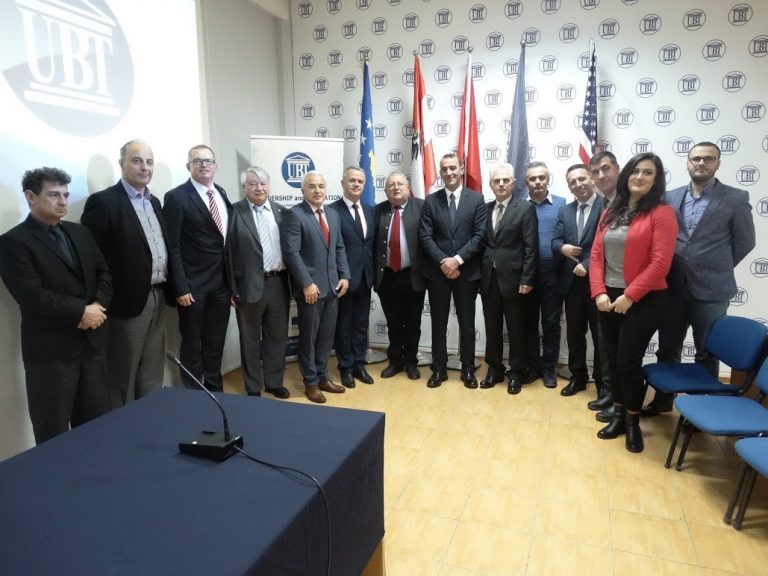
Security, a Kosovar and Global Challenge
03/02/2016Organized by the UBT and the Austrian-Kosovo Society, a conference on the theme “Austrian Kosovo Smart Security Day” was held at the UBT campus on Tuesday. A big number of experts from Austria and Kosovo, including professors and students of the UBT College, contributed with their presentations to the conference. The event was moderated by Gunther Fehlinger, President of the Austrian Economic Chamber in Kosovo (OeKG).
Opening the conference, Mr. Wolfgang Grossruck, former member of the Austrian Parliament and President of the Austrian-Kosovo Society, thanked the UBT for organizing this important event. He advised that security was not a local but rather a global challenge.
Grossruck also commented on the internal security in Kosovo, as a very important factor for the country’s development and the citizens’ wellbeing. Among others, he said, “We are supporting Kosovo also by bringing here new work experiences on the voluntary basis, as it is the case in Austria.”
The conference moderator also mentioned huge contribution that Grossruck had made to the campaign “Say Yes to Kosovo.”
Daut Haradinaj, member of the Kosovo Parliament said the political crisis in the country would end one day and the parliament would have to discuss the overall security and the transformation of the Kosovo Security Force (FSK) into an army. “In order for Kosovo to become a NATO member, we need to have our army, and a good example we should follow is that of Albania,” Haradinaj said.
Ismail Smakiqi, Director of the Police Academy in Vushtrri, spoke about the successes of the academy in accomplishing bachelor programs on the security issues. He advised that two generations had already graduated from the academy that he administers.
Former Albanian Ambassador to Kosovo, Islam Lauka, also addressed the conference. He highlighted two problems that Kosovo was facing at this stage – terrorism and Russia – which, I his view were obstacles to Kosovo’s membership of important organizations. He noted that Kosovo was not member of any security organization and this has the consequences because both Kosovo and Albania were being described as “contributors to the development of terrorism or as transit countries of ISIS fighters.”
Mr. Lauka also spoke about the way our countries were being seen by foreign media. In this respect, he mentioned the British media according to which, Albanians “know nothing except terrorism.” According to Lauka, this perception is inaccurate untrue because actually only 70 Kosovars are part of the foreign wars while the number of citizens of Albania is even smaller. He also spoke about the problems with Russia, more specifically its policies and stances toward Kosovo. In this regard he also referred to the case of the annexation of Crimea, which was recognized by Russia, while Russia refuses to recognize Kosovo.
In conclusion, Ambassador Lauka urged the EU to stay true to its words and decisions on Kosovo, especially with the case of visa liberalization, noting that Kosovo was the most isolated country of the region.
Florian Qehaja, executive director of the Center for Security Studies, said close cooperation between Kosovo and Austria in the security aspects was very important. He also spoke about the threats that the Kosovar society was facing as a consequence of Kosovo failure to be member of the international security and other organizations, such as the Police Convention, NATO, including UNESCO.
Qehaja also commented on the corruption in Kosovo. “Another factor that seriously damages Kosovo’s image in the security aspect is the high-level corruption in our institutions, being it a problem that needs to be addressed seriously,” Qehaja said.
Joseph Schvarrzmansseder, one of the very important participants of the conference, spoke about Austrian model volunteer firefighters. According to him, Kosovo should follow this example. He said it was not only army that assisted in emergency situations but volunteer teams could make a huge contribution, especially in the events of fires, since the volunteer firefighters can act within minutes and as a result the damages could be much smaller.
Rifat Marmullaku, a representative of the OSCE mission I Kosovo, spoke about the importance of the security for the life of the citizens, focusing also on the role that the OSCE has been playing in this respect. Marmullaku noted that “a very important challenge for all countries remain communication and access to digital world. This is a challenge not only for small countries for the world’s powerful states as well.”
The conference ended with a presentation by Mentor Hoxha, a security observer, who described security as one of the most challenges for our country.